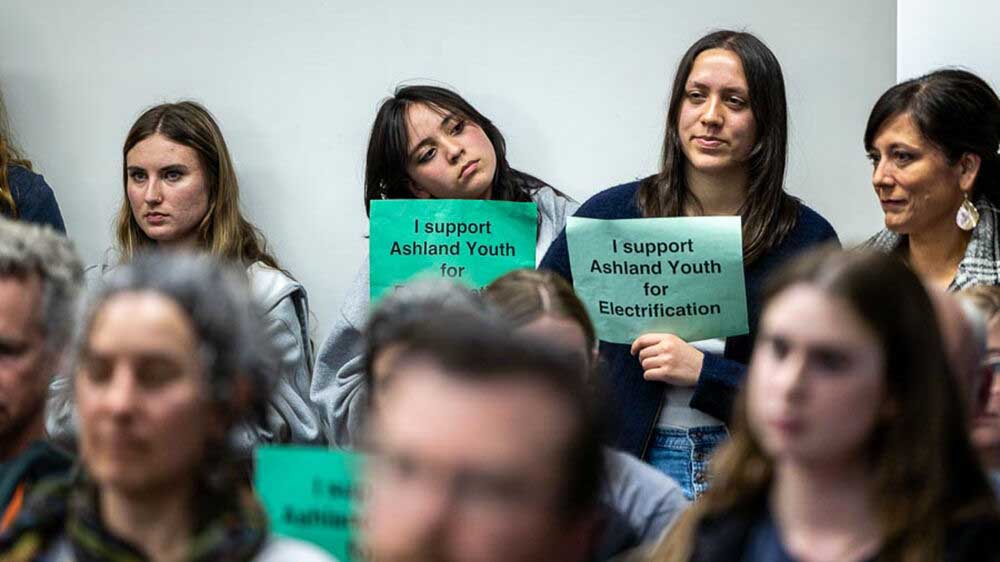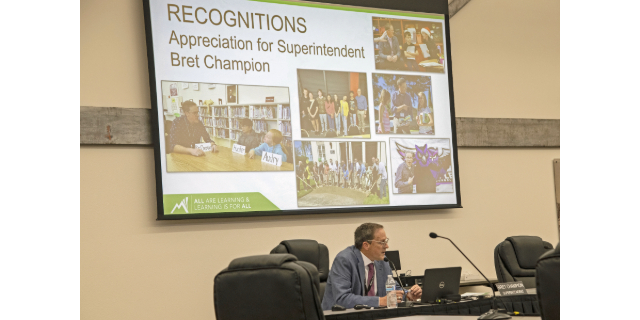Ashland moves toward natural gas ban in new homes
Published 5:55 am Friday, June 9, 2023

- A standing-room crowd packed the Ashland City Council chambers in March to show support for a movement by local students to encourage a move away from natural gas.
Ashland may be the next city in Oregon to ban natural gas in some of its buildings in an effort to reduce greenhouse gas emissions and improve indoor air quality.
Ashland City Council on Tuesday directed the city’s staff and attorney to draft an electrification ordinance that would bar natural gas hookups in new residential construction. The city also hopes to eventually draft a similar ordinance for commercial and industrial buildings and for building remodels.
“We have seen the impacts of climate change rolling in on us and we have to address the root causes,” Ashland Mayor Tonya Graham told The Oregonian/OregonLive. “We cannot simultaneously build out fossil fuel gas infrastructure and protect our children’s future.”
Ashland is one of several cities in Oregon that have adopted climate action plans and hope to institute a natural gas ban — despite opposition from Oregon’s natural gas industry and a federal lawsuit filed in California that seeks to halt similar ordinances nationwide.
In February, Eugene became the first city in Oregon to prohibit natural gas hookups in new residential construction. It’s one of nearly 100 cities, towns and counties around the U.S. to adopt such restrictions. In May, the state of New York passed a law requiring most new buildings to be zero-emissions starting in 2026, effectively banning natural gas. And Washington state’s State Building Code Council changed the energy code last year to require electric heat pumps in new homes and buildings.
Eugene’s ordinance was to take effect for building permits submitted on or after June 30, but opponents — funded largely by NW Natural, Oregon’s largest investor-owned gas utility — submitted enough signatures to put it to a citywide vote in November.
In April, a court decision put the Eugene ordinance further in jeopardy when the 9th U.S. Circuit Court of Appeals in San Francisco struck down Berkeley, California’s first-in-the-nation natural gas ban. Because the 9th Circuit has jurisdiction over most of the Western states, the Eugene ordinance could potentially be overturned if it’s challenged in court. Last month, Berkeley filed an appeal in the case.
Ashland plans to take a different approach to a gas ban to avoid Eugene’s legal challenges, said Bryan Sohl, chair of the Ashland Climate and Environmental Policy Advisory Committee.
Ashland will explore three different approaches, including setting a standard for indoor air pollutants such as carbon dioxide, methane, nitrogen oxides, and nitrogen dioxide, Sohl said. Such an emissions-based approach was adopted by the state of New York. Another option is locally amending the building code — though broad in impact, that process would be long and onerous, he said. A third path would be to ban new natural gas piping in the city’s rights-of-way, though that would limit the ban’s scope to previously undeveloped areas.
The proposal for an Ashland gas ban came from the city’s youth, city officials said. In March, 400 students marched out of Ashland High School as part of a state-wide climate protest. The next day, students affiliated with the Rogue Climate Action Team, the youth-led group of southern Oregon nonprofit Rogue Climate, presented a draft of a gas ban ordinance to the City Council, Mayor Graham said.
Proponents of Ashland’s ban also point to a proposed 8.1% rate increase for residential customers by Avista Gas, the local natural gas provider, which follows an 18% rate increase approved last year.
Other Oregon cities considering a natural gas ban include Milwaukie and Corvallis. In Milwaukie, the City Council passed two resolutions last December that direct city staff to draft ordinances to ban natural gas hookups in new construction and remove gas infrastructure from existing city-owned buildings through retrofits.
And in Corvallis, the City Council in January voted to shorten the planned extension of the city’s franchise agreement with NW Natural from 10 to three years after residents expressed interest in a natural gas ban in new construction.







